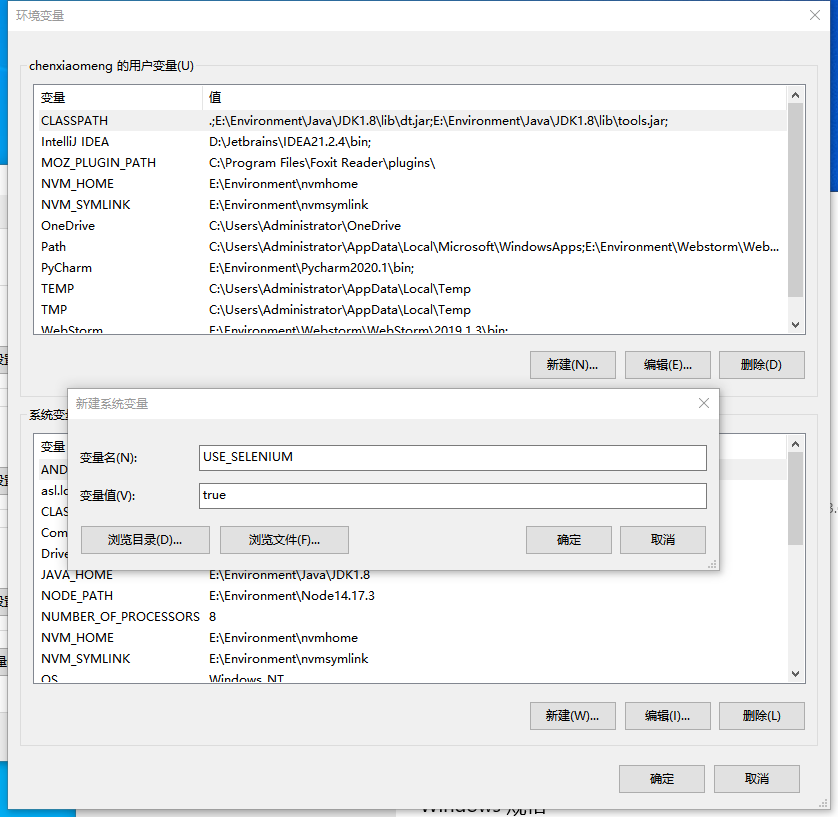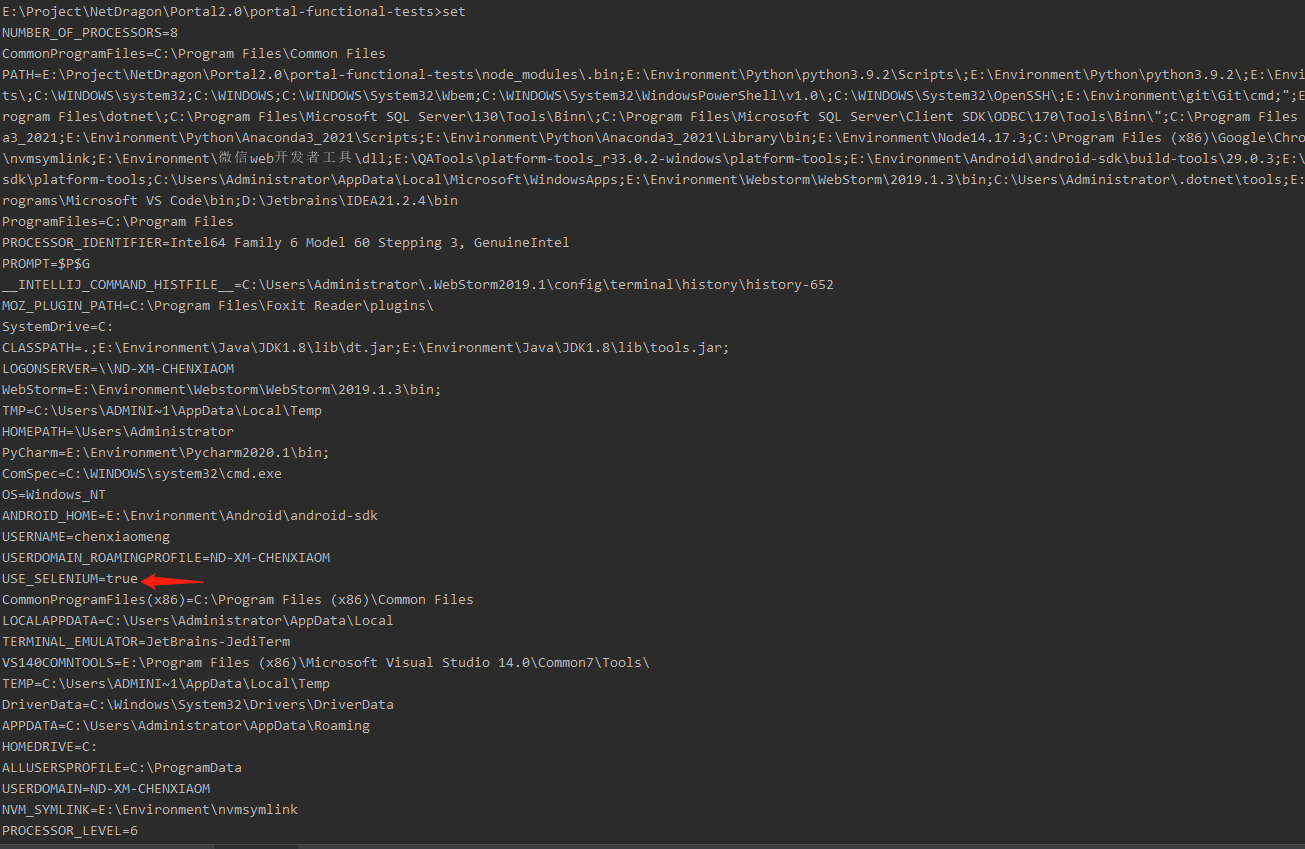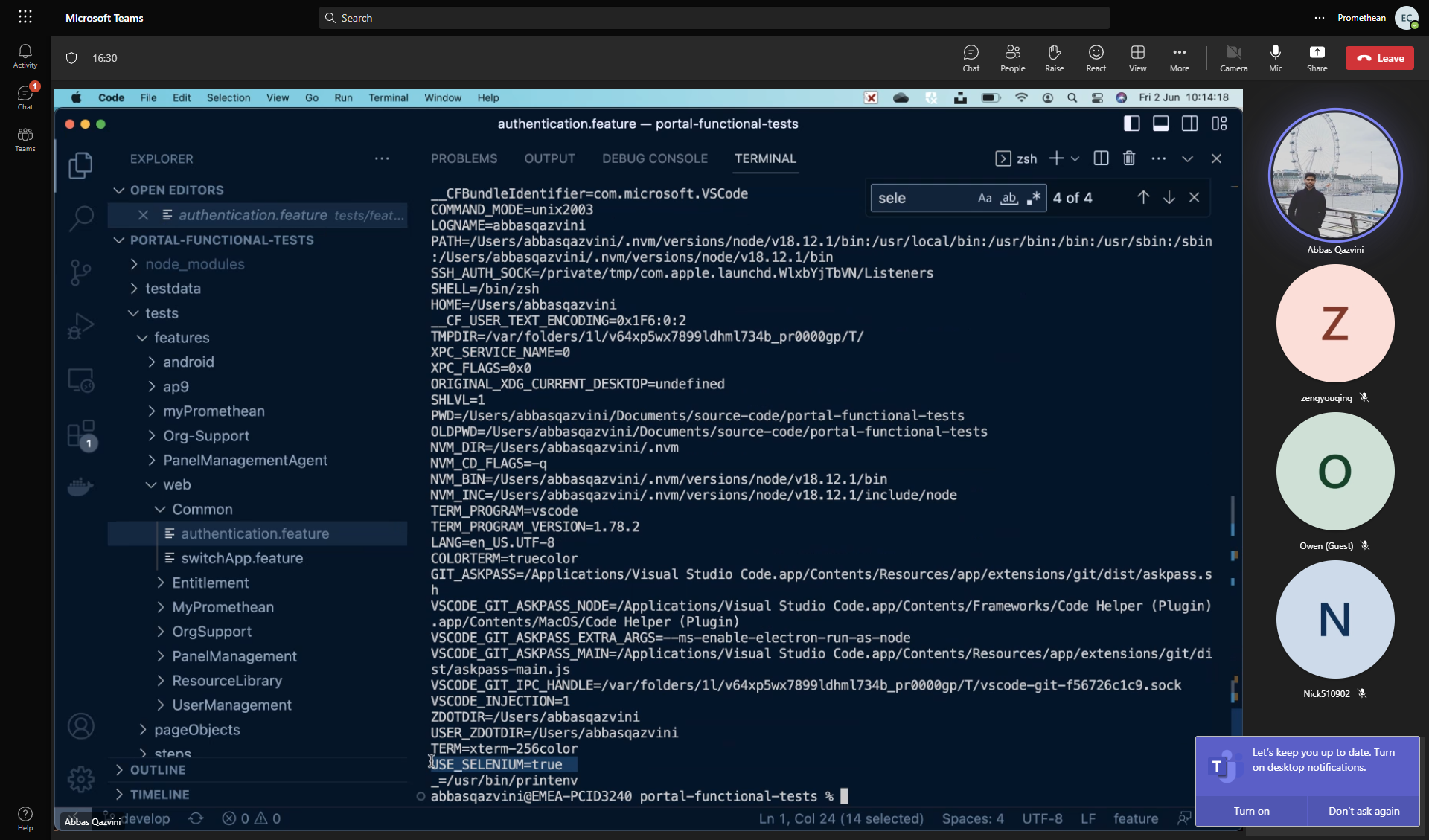【WebDriver.io】集成browserstack后怎么运行
注意 windows上 要在 power shell 上运行才算是linux,如果是在系统内部运行属于cmd 会显示 'export' 不是内部或外部命令,也不是可运行的程序
第一种方式:
先安装对应的 第三方包
npm install
默认使用browserstack 所以当前应该先在本地跑命令把当前使用selenium先用起来
mac使用
export USE_SELENIUM=true
windows只能使用点开框的方式去做

设置完之后只需要重启使用的软件 就可以对当前的环境变量进行修改
打印出当前的环境变量
mac
printenv
windows
set

如果我要switch branch,切换终端等于重新开始,也要先确定一下当前的环境变量 比如USE_SELENIUM 参数是不是为true 没有的话 可以再设置一次

第二种方式:
增加自己的脚本命令行
可以使用 npm run testSelenium 也可以自己增加对应的脚本
package.json
{ "name": "portal-functional-tests", "version": "2.0.0", "private": true, "main": "index.js", "scripts": { "test": "wdio run wdio.conf.js", "local": "wdio run wdio.conf.js --skipSeleniumInstall true", "report": "allure generate allure-results --clean", "allure": "allure generate allure-results --clean && allure open", "prelocal": "rimraf ./allure-results", "testBrowserStack": "npm run test -- --platform web --maxInstances 4", "testSelenium": "export USE_SELENIUM=true && npm run test -- --platform web --maxInstances 5 --headlesss" }, "author": "Xiangyu Li", "license": "ISC", "devDependencies": { "@babel/core": "^7.16.0", "@babel/preset-env": "^7.16.0", "@babel/register": "^7.16.0", "@wdio/allure-reporter": "^7.16.6", "@wdio/appium-service": "^7.16.11", "@wdio/browserstack-service": "^8.10.5", "@wdio/cli": "^7.16.6", "@wdio/cucumber-framework": "^7.16.6", "@wdio/local-runner": "^7.16.6", "@wdio/selenium-standalone-service": "^7.19.1", "allure-commandline": "^2.13.8", "appium": "^1.22.1", "axios": "^0.24.0", "kill-port": "^1.6.1", "selenium-standalone": "^8.3.0", "sharp": "^0.30.0", "tesseract.js": "^2.1.5" }, "dependencies": { "node-xlsx": "^0.21.0", "qs": "^6.11.0" } }
wdio.conf
const { checkAdbIsOn } = require("./utils/util"); const { adbConnect } = require("./utils/adbHelper"); const { AppiumHelper } = require("./utils/appiumHelper"); const platform = process.argv.indexOf('--platform') != -1 ? process.argv[process.argv.indexOf('--platform') + 1] : '**' const feature = process.argv.indexOf('--feature') != -1 ? process.argv[process.argv.indexOf('--feature') + 1] : '*' const seleniumCapabilities = [ { maxInstances: process.argv.indexOf("--maxInstances") !== -1 ? parseInt(process.argv[process.argv.indexOf("--maxInstances") + 1]) : 1, browserName: "chrome", "goog:chromeOptions": { args: process.argv.indexOf("--headless") !== -1 ? [ "--headless", "--no-sandbox", "--disable-dev-shm-usage", "--disable-gpu", "--window-size=1600,1024", ] : ["--window-size=1600,1024"], prefs: { "intl.accept_languages": "en,en_US", "download.default_directory": process.cwd().toString() + "/testdata/downloadResources", }, }, acceptInsecureCerts: true, }, ]; const seleniumService = [ "selenium-standalone", { drivers: { chrome: "latest" }, skipSeleniumInstall: process.argv.indexOf("--skipSeleniumInstall") !== -1 ? process.argv[process.argv.indexOf("--skipSeleniumInstall") + 1] : false, }, ]; const browserStackCapabilities = [ { browserName: 'Chrome', 'bstack:options': { os: 'Windows', osVersion: '11', browserVersion: '112.0', buildName: "PromWeb", buildIdentifier: "${BUILD_NUMBER}", projectName: "PromWeb" } }, { browserName: 'Firefox', 'bstack:options': { os: 'Windows', osVersion: '11', browserVersion: '112.0', buildName: "PromWeb", buildIdentifier: "${BUILD_NUMBER}", projectName: "PromWeb" } }, { browserName: 'Safari', 'bstack:options': { os: 'OS X', osVersion: 'Big Sur', browserVersion: '14.1', buildName: "promWeb", buildIdentifier: "${BUILD_NUMBER}", projectName: "PromWeb" } } ]; const browserStackService = [ "browserstack", { browserstackLocal: true, opts: { forcelocal: false } }, ]; exports.config = { user: process.env.BROWSERSTACK_USERNAME, key: process.env.BROWSERSTACK_ACCESS_KEY, host: 'hub.browserstack.com', // // ==================== // Runner Configuration // ==================== // // // ================== // Specify Test Files // ================== // Define which test specs should run. The pattern is relative to the directory // from which `wdio` was called. // // The specs are defined as an array of spec files (optionally using wildcards // that will be expanded). The test for each spec file will be run in a separate // worker process. In order to have a group of spec files run in the same worker // process simply enclose them in an array within the specs array. // // If you are calling `wdio` from an NPM script (see https://docs.npmjs.com/cli/run-script), // then the current working directory is where your `package.json` resides, so `wdio` // will be called from there. // specs: [`./tests/features/${platform}/**/${feature}.feature`], // Patterns to exclude. exclude: [ // 'path/to/excluded/files' ], // // ============ // Capabilities // ============ // Define your capabilities here. WebdriverIO can run multiple capabilities at the same // time. Depending on the number of capabilities, WebdriverIO launches several test // sessions. Within your capabilities you can overwrite the spec and exclude options in // order to group specific specs to a specific capability. // // First, you can define how many instances should be started at the same time. Let's // say you have 3 different capabilities (Chrome, Firefox, and Safari) and you have // set maxInstances to 1; wdio will spawn 3 processes. Therefore, if you have 10 spec // files and you set maxInstances to 10, all spec files will get tested at the same time // and 30 processes will get spawned. The property handles how many capabilities // from the same test should run tests. // maxInstances: (process.argv.indexOf('--maxInstances') != -1) ? parseInt(process.argv[process.argv.indexOf('--maxInstances') + 1]) : 1, // // If you have trouble getting all important capabilities together, check out the // Sauce Labs platform configurator - a great tool to configure your capabilities: // https://saucelabs.com/platform/platform-configurator // capabilities: process.env.USE_SELENIUM ? seleniumCapabilities : browserStackCapabilities, // // =================== // Test Configurations // =================== // Define all options that are relevant for the WebdriverIO instance here // // Level of logging verbosity: trace | debug | info | warn | error | silent logLevel: 'warn', // // Set specific log levels per logger // loggers: // - webdriver, webdriverio // - @wdio/browserstack-service, @wdio/devtools-service, @wdio/sauce-service // - @wdio/mocha-framework, @wdio/jasmine-framework // - @wdio/local-runner // - @wdio/sumologic-reporter // - @wdio/cli, @wdio/config, @wdio/utils // Level of logging verbosity: trace | debug | info | warn | error | silent // logLevels: { // webdriver: 'info', // '@wdio/appium-service': 'info' // }, // // If you only want to run your tests until a specific amount of tests have failed use // bail (default is 0 - don't bail, run all tests). bail: 0, // // Set a base URL in order to shorten url command calls. If your `url` parameter starts // with `/`, the base url gets prepended, not including the path portion of your baseUrl. // If your `url` parameter starts without a scheme or `/` (like `some/path`), the base url // gets prepended directly. baseUrl: 'http://localhost', // // Default timeout for all waitFor* commands. waitforTimeout: 10000, // // Default timeout in milliseconds for request // if browser driver or grid doesn't send response connectionRetryTimeout: 1200000, // // Default request retries count connectionRetryCount: 3, // // Appium port // port: 4723, // path: '/wd/hub', // // Test runner services // Services take over a specific job you don't want to take care of. They enhance // your test setup with almost no effort. Unlike plugins, they don't add new // commands. Instead, they hook themselves up into the test process. services: process.env.USE_SELENIUM ? [seleniumService] : [browserStackService], // Framework you want to run your specs with. // The following are supported: Mocha, Jasmine, and Cucumber // see also: https://webdriver.io/docs/frameworks // // Make sure you have the wdio adapter package for the specific framework installed // before running any tests. framework: 'cucumber', // // The number of times to retry the entire specfile when it fails as a whole // specFileRetries: 1, // // Delay in seconds between the spec file retry attempts // specFileRetriesDelay: 0, // // Whether or not retried specfiles should be retried immediately or deferred to the end of the queue // specFileRetriesDeferred: false, // // Test reporter for stdout. // The only one supported by default is 'dot' // see also: https://webdriver.io/docs/dot-reporter reporters: [['allure', { outputDir: 'allure-results', disableWebdriverStepsReporting: false, disableWebdriverScreenshotsReporting: false, }]], // // If you are using Cucumber you need to specify the location of your step definitions. cucumberOpts: { // <string[]> (file/dir) require files before executing features require: ['./tests/steps/**/*.js'], // <boolean> show full backtrace for errors backtrace: false, // <string[]> ("extension:module") require files with the given EXTENSION after requiring MODULE (repeatable) requireModule: [], // <boolean> invoke formatters without executing steps dryRun: false, // <boolean> abort the run on first failure failFast: false, // <string[]> (type[:path]) specify the output format, optionally supply PATH to redirect formatter output (repeatable) format: ['pretty'], // <boolean> hide step definition snippets for pending steps snippets: true, // <boolean> hide source uris source: true, // <string[]> (name) specify the profile to use profile: [], // <boolean> fail if there are any undefined or pending steps strict: false, // <string> (expression) only execute the features or scenarios with tags matching the expression tagExpression: process.argv.indexOf('--tag') != -1 ? `@${process.argv[process.argv.indexOf('--tag') + 1]}` : 'not @skip', // <number> timeout for step definitions timeout: 180000, // <boolean> Enable this config to treat undefined definitions as warnings. ignoreUndefinedDefinitions: false }, // // ===== // Hooks // ===== // WebdriverIO provides several hooks you can use to interfere with the test process in order to enhance // it and to build services around it. You can either apply a single function or an array of // methods to it. If one of them returns with a promise, WebdriverIO will wait until that promise got // resolved to continue. /** * Gets executed once before all workers get launched. * @param {Object} config wdio configuration object * @param {Array.<Object>} capabilities list of capabilities details */ // onPrepare: async function (config, capabilities) { // }, /** * Gets executed before a worker process is spawned and can be used to initialise specific service * for that worker as well as modify runtime environments in an async fashion. * @param {String} cid capability id (e.g 0-0) * @param {[type]} caps object containing capabilities for session that will be spawn in the worker * @param {[type]} specs specs to be run in the worker process * @param {[type]} args object that will be merged with the main configuration once worker is initialised * @param {[type]} execArgv list of string arguments passed to the worker process */ onWorkerStart: async function (cid, caps, specs, args, execArgv) { if ((process.argv.indexOf('--panel') != -1) || (process.argv.indexOf('--android') != -1)) { await require('kill-port')(this.port) await require('./utils/appiumHelper').AppiumHelper.start(this.port) } }, /** * Gets executed just before initialising the webdriver session and test framework. It allows you * to manipulate configurations depending on the capability or spec. * @param {Object} config wdio configuration object * @param {Array.<Object>} capabilities list of capabilities details * @param {Array.<String>} specs List of spec file paths that are to be run * @param {String} cid worker id (e.g. 0-0) */ // beforeSession: function (config, capabilities, specs, cid) { // }, /** * Gets executed before test execution begins. At this point you can access to all global * variables like `browser`. It is the perfect place to define custom commands. * @param {Array.<Object>} capabilities list of capabilities details * @param {Array.<String>} specs List of spec file paths that are to be run * @param {Object} browser instance of created browser/device session */ before: async function (capabilities, specs) { await require('./utils/util').load() if (process.argv.indexOf('--panel') != -1) { const panelID = process.argv[process.argv.indexOf('--panel') + 1].toString().split(',')[0] let adb = await checkAdbIsOn(panelID) if (!adb) { await adbConnect(panelID) } try { await AppiumHelper.start() } catch (e) { } await require('./utils/appiumHelper').AppiumHelper.addPanelClient(this.port, panelID) } if (process.argv.indexOf('--android') != -1) { const androidID = process.argv[process.argv.indexOf('--android') + 1] await require('./utils/appiumHelper').AppiumHelper.addAndroidClient(this.port, androidID) } }, /** * Runs before a WebdriverIO command gets executed. * @param {String} commandName hook command name * @param {Array} args arguments that command would receive */ // beforeCommand: function (commandName, args) { // }, /** * Cucumber Hooks * * Runs before a Cucumber Feature. * @param {String} uri path to feature file * @param {GherkinDocument.IFeature} feature Cucumber feature object */ // beforeFeature: function (uri, feature) { // }, /** * * Runs before a Cucumber Scenario. * @param {ITestCaseHookParameter} world world object containing information on pickle and test step * @param {Object} context Cucumber World object */ beforeScenario: async function (world, context) { console.log("start execution:beforeScenario hook...") const tags = world.pickle.tags console.log("Number of case tags:" + tags.length) if (!(tags.length === 0)) { console.log("is include '@needMultiDevice' tag") for (const item of tags) { const tagText = item.name console.log("tag name:" + tagText) if (tagText.includes("needMultiDevice")) { const panelIDs = await (process.argv[process.argv.indexOf('--panel') + 1].toString().split(',')) console.log("panels list:" + panelIDs) let port = 4723 for (let i = 1; i < panelIDs.length; i++) { console.log("panels[0]:" + panels.get(panelIDs[0])) if ((!(panelIDs[i] === panelID)) && (!(panels.get(panelIDs[0]) === panelIDs[i]))) { port = port + 2 console.log("use port:" + port) await require('kill-port')(port) await require('./utils/appiumHelper').AppiumHelper.start(port) console.log("device:" + panelIDs[i] + "start connecting...") let panelMessage = await require('./utils/appiumHelper').AppiumHelper.addPanelClient_2(port, panelIDs[i]) panels.set(panelIDs[i], panelMessage) } } } } } }, /** * * Runs before a Cucumber Step. * @param {Pickle.IPickleStep} step step data * @param {IPickle} scenario scenario pickle * @param {Object} context Cucumber World object */ // beforeStep: function (step, scenario, context) { // }, /** * * Runs after a Cucumber Step. * @param {Pickle.IPickleStep} step step data * @param {IPickle} scenario scenario pickle * @param {Object} result results object containing scenario results * @param {boolean} result.passed true if scenario has passed * @param {string} result.error error stack if scenario failed * @param {number} result.duration duration of scenario in milliseconds * @param {Object} context Cucumber World object */ afterStep: async function (step, scenario, { error, duration, passed }, context) { if (error) { const { logcat } = require('./utils/adbHelper') await browser.takeScreenshot() const reporter = require('@wdio/allure-reporter').default if (global.panel) { const base64Data = await panel.takeScreenshot() const panelScreenshot = Buffer.from(base64Data, 'base64') reporter.addAttachment('panel-screenshot', panelScreenshot, '') const panelLog = logcat(panelID) reporter.addAttachment('panel-log', panelLog, 'text/plain') } if (global.android) { const base64Data = await android.takeScreenshot() const androidScreenshot = Buffer.from(base64Data, 'base64') reporter.addAttachment('android-screenshot', androidScreenshot, '') const androidLog = logcat(androidID) reporter.addAttachment('android-log', androidLog, 'text/plain') } } }, /** * * Runs after a Cucumber Scenario. * @param {ITestCaseHookParameter} world world object containing information on pickle and test step * @param {Object} result results object containing scenario results * @param {boolean} result.passed true if scenario has passed * @param {string} result.error error stack if scenario failed * @param {number} result.duration duration of scenario in milliseconds * @param {Object} context Cucumber World object */ afterScenario: async function (world, result, context) { const { TestrailTool } = require('./utils/testrail-support') if (world.pickle.tags[0]) { world.pickle.tags.forEach(item => { const caseId = item.name.replace(/[^0-9]/ig, "") if (caseId) { const comment = result.error ? result.error.split('\n')[0] : '' TestrailTool.collectResult(caseId, result.passed, comment) } }) } }, /** * * Runs after a Cucumber Feature. * @param {String} uri path to feature file * @param {GherkinDocument.IFeature} feature Cucumber feature object */ // afterFeature: function (uri, feature) { // }, /** * Runs after a WebdriverIO command gets executed * @param {String} commandName hook command name * @param {Array} args arguments that command would receive * @param {Number} result 0 - command success, 1 - command error * @param {Object} error error object if any */ // afterCommand: function (commandName, args, result, error) { // }, /** * Gets executed after all tests are done. You still have access to all global variables from * the test. * @param {Number} result 0 - test pass, 1 - test fail * @param {Array.<Object>} capabilities list of capabilities details * @param {Array.<String>} specs List of spec file paths that ran */ after: async function (result, capabilities, specs) { if (global.panel) { await panel.deleteSession() } if (global.android) { await android.deleteSession() } const { TestrailTool } = require('./utils/testrail-support') const TESTRAIL_CONFIG = { email: process.env.TESTRAIL_USERNAME, apiKey: process.env.TESTRAIL_PASSWORD_KEY, runId: process.env.TESTRAIL_RUN_ID, url: process.env.TESTRAIL_REST_URL } if (TESTRAIL_CONFIG.email) { await TestrailTool.uploadToTestrail(TESTRAIL_CONFIG) } }, /** * Gets executed right after terminating the webdriver session. * @param {Object} config wdio configuration object * @param {Array.<Object>} capabilities list of capabilities details * @param {Array.<String>} specs List of spec file paths that ran */ // afterSession: function (config, capabilities, specs) { // }, /** * Gets executed after all workers got shut down and the process is about to exit. An error * thrown in the onComplete hook will result in the test run failing. * @param {Object} exitCode 0 - success, 1 - fail * @param {Object} config wdio configuration object * @param {Array.<Object>} capabilities list of capabilities details * @param {<Object>} results object containing test results */ onComplete: async function (exitCode, config, capabilities, results) { if ((process.argv.indexOf('--panel') != -1) || (process.argv.indexOf('--android') != -1)) { await require('kill-port')(this.port) } }, /** * Gets executed when a refresh happens. * @param {String} oldSessionId session ID of the old session * @param {String} newSessionId session ID of the new session */ //onReload: function(oldSessionId, newSessionId) { //} }
声明 欢迎转载,但请保留文章原始出处:) 博客园:https://www.cnblogs.com/chenxiaomeng/
如出现转载未声明 将追究法律责任~谢谢合作


 浙公网安备 33010602011771号
浙公网安备 33010602011771号